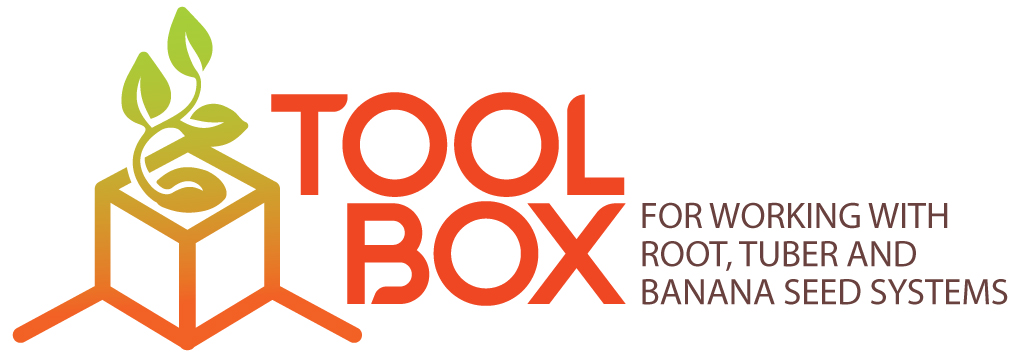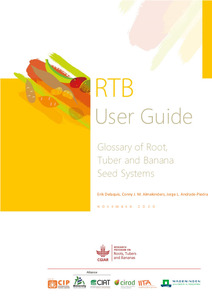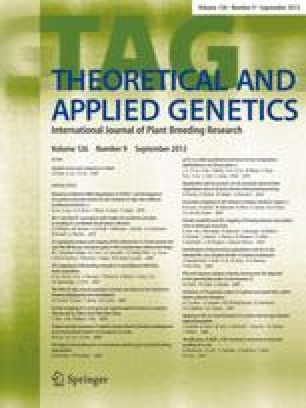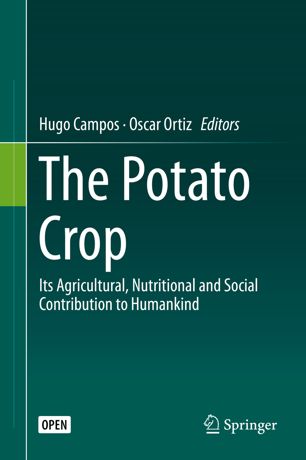Twimanye Makoye is a commercial sweetpotato farmer in Bukombe District in Northwest Tanzania. He produces sweetpotato roots on about 14 hectares of land and sells his produce to customers in Dar es Salaam, the country’s commercial hub. The income from this business has enabled him to enroll his children in school, build a home, and acquire a plot to construct a commercial building in the neighboring town of Runzewe.
Makoye’s success, however, is not without constraints. Availability of quality seed is one limitation. “To plant one acre, you need seed that costs 150,000 Tanzanian shillings (~USD 70)” he says. “That can be very expensive if you are intending to plant on a large area.”
To overcome this constraint, Makoye began to conserve and multiply his own seed. Eventually, he became one of the most reputable seed producers in his village.
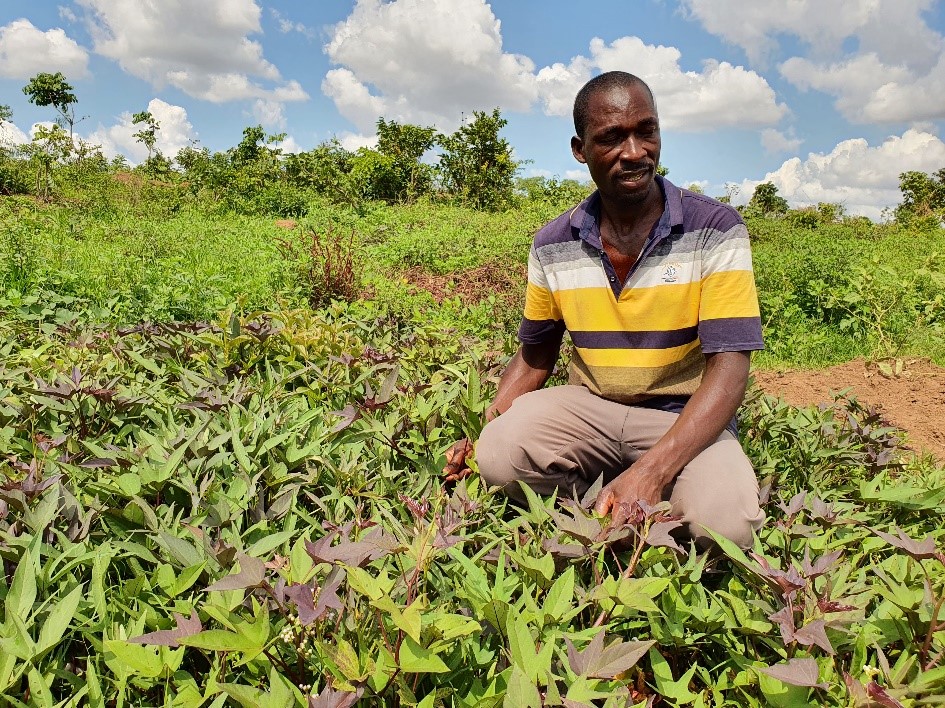
Twimanye Makoye at one of his seed production plots in Bukombe District, Tanzania. Photo credit: K. Ogero/CIP
Makoye also faces the challenge of maintaining the quality of his seed which impacts his root yield. He currently averages approximately six tonnes of roots per hectare (t/ha) on his farm, well below potential yields of 20 t/ha. Sweetpotato viruses reduce yields but Makoye could reduce this threat by removing plants with symptoms from his seed plots. However, this is not a foolproof defense since some viruses are asymptomatic.
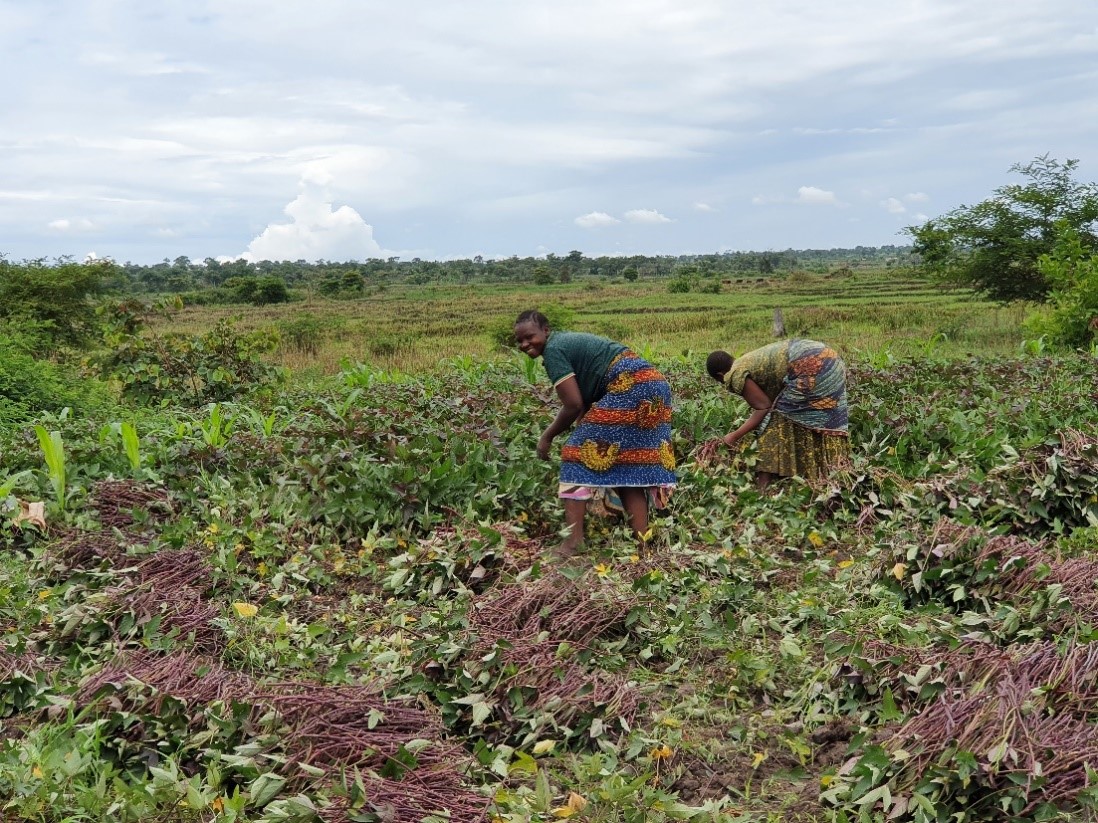
Customers harvesting sweetpotato seed purchased from Makoye in Bukombe District, Tanzania. Photo credit: K. Ogero/CIP
Farmers such as Makoye have inspired a global group of researchers working on root, tuber and banana crops (RTB crops) to develop the RTB Toolbox website: a set of tools to design seed system interventions to ensure that farmers and specialized seed producers are able to produce and/or access quality seed. Across RTB crops, seed systems have many common challenges and are often neglected by private seed companies. The bulky seed is expensive to transport, spoils easily, and can harbor health problems from viruses to weevils. The Toolbox for working with root, tuber and banana seed systems aims to address these challenges. Users such as program managers, extensionists and researchers can design interventions using the 11 individual tools (or apply them in combination) to improve seed systems.
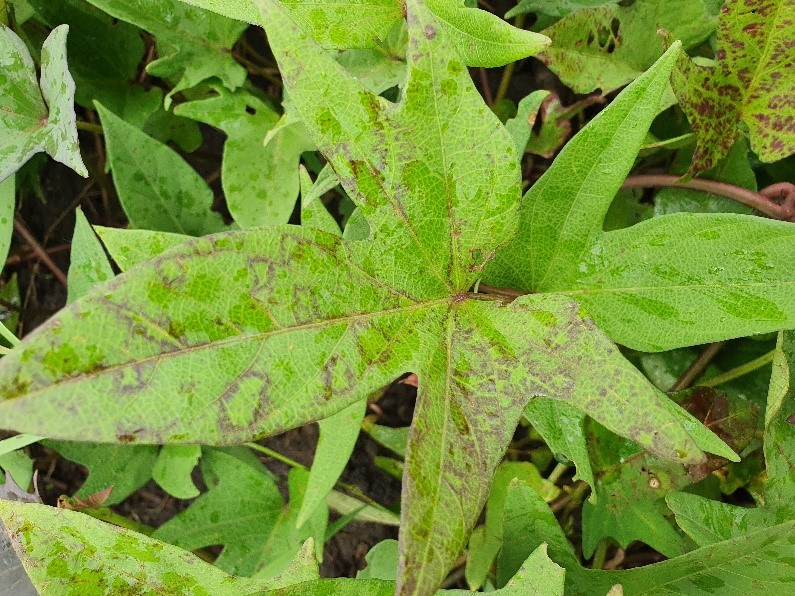
Virus-infected plant in Makoye’s seed production plot. The purple rings are symptoms of sweetpotato feathery mottle virus (SPFMV). Bukombe District, Tanzania. Photo credit: K. Ogero/CIP
Tools4SeedSystems launched
Speaking during the launch event in March 2021, Yemi Akinbamijo, Executive Director of the Forum for Agricultural Research in Africa (FARA), noted that farmers can’t enjoy the benefits of improved varieties if adoption is not improved. The Toolbox, he said, would play an important role in boosting adoption: “Whatever touches on the seed system, touches on food security.”
Each of the tools has been created, adapted and validated on the ground with local partners across three continents, said Graham Thiele, Director of the CGIAR Research Program on Roots, Tubers and Bananas. For instance, the integrated seed health approaches and models have been validated in contexts similar to Makoye’.
For example, a combination of tools, including an integrated seed health approach, impact network analysis and the multi-stakeholder framework, has been used to rapidly assess the potato seed system and evaluate the risk of disease spread in the country of Georgia. Kelsey Andersen, Associate Professor at Kansas State University, told the audience that this information was used by program managers to plan and implement an appropriate integrated seed health strategy to improve the quality of seed available. While the tools were designed to address knowledge gaps for RTB crops, they can also be used for the seed systems of other crops, including self-pollinated crops, legumes and forages.
An animated video introducing the Toolbox for working with root, tuber, and banana seed systems.
Next steps: use of the Toolbox
The Toolbox will be used by private seed companies, national agricultural research systems, non-governmental organizations and others seeking to improve seed systems. Accomplishing this goal quickly on a large scale will require capacity building and cross-learning between different initiatives. The RTB-CGIAR seed systems community of practice is engaging with seed system stakeholders to strengthen their capacity to use the Toolbox.
By building capacity for using the Toolbox, RTB is investing in seed systems expertise in low- and middle-income countries. Empowering actors in both the private and public sectors will stimulate partnerships, which are important for the long-term sustainability of seed systems. This work will not only unlock the potential of RTB crops, but also that of other food and livelihood security crops. As a follow-up to the launch, the Toolbox team plans to hold a series of online training events with national agricultural research institutes. These will be hosted in partnership with tertiary training institutions in sub-Saharan Africa, Latin America and the Caribbean and Southeast Asia.
Such initiatives require multi-stakeholder approaches for technical support and funding. Governments can make this initiative sustainable by investing not only in capacity building, but also in the application of the skills gained. The latter may include increasing investments in agricultural research and production of early generation seed to increase varietal turnover, contributing towards addressing crop productivity challenges, and repaying investments through increased food security and household incomes.
We’d like your input so that we can make the upcoming trainings as responsive as possible to your needs and preferences. Please let us know about yourself and your interests via our online survey. We look forward to continued interactions with you!
